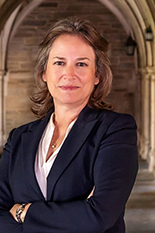 |

|
 |
Prof. Emily A. Carter |
|
Title: How Quantum Mechanics Helps Identify Mechanisms and Discover Materials to Combat Climate Change
Speaker: Prof. Emily A. Carter
Tuesday, October 25, 2022 at 4:00 PM -- 1101 A. James Clark Hall, University of Maryland
Abstract: Each year that passes now brings more evidence that carbon dioxide and methane emissions are bringing our world closer to a tipping point beyond which it is unclear how humans and other living creatures will survive. I have been driven by this concern for the last 15 years. I decided a decade and a half ago to reorient all my research to work on sustainable energy solutions. I am a physical chemist by training, with expertise in quantum mechanics methods development and applications primarily related to materials science and chemistry. While I still work on sustainable energy, it is now evident that such solutions are not enough. We must stop emitting additional carbon into the atmosphere; we must go not just to zero but to negative emissions, in order to mitigate against worsening climate change caused by nearly a century and a half of fossil fuel extraction and burning. Thus, in addition to materials discovery for sustainable, carbon-free electricity (e.g., solar cells, fusion, solid oxide fuel cells), I work on catalyst discovery for renewable fuels, via (electro/solar thermo)-chemical water splitting and (photo/electro/solar thermo)-chemical carbon dioxide reduction. If we can produce liquid fuels from carbon dioxide and water – effectively running combustion backwards – via innovative catalysts that take in sunlight or carbon-free excess electricity, we will recycle carbon rather than extract and add more of it to the atmosphere and oceans. However, recycling carbon dioxide and methane is still not enough. We must convert and store carbon dioxide and methane permanently. Rather than focus on subsurface sequestration of carbon dioxide, let’s find more productive – and less risky – uses for CO2. In this talk, I will describe research related to carbon cycling back to fuels and useful chemicals, along with a vision for getting to negative emissions enabled by electrocatalysis. These approaches, along with available and emerging strategies in agriculture, forestry, and construction materials, may let our grandchildren and their descendants still enjoy the world we have been lucky enough to inhabit up to now. I hope that my talk will inspire others to join the effort.
http://ireap.umd.edu/events/paint-branch-distinguished-lecture-applied-physics
October 6, 2022
|